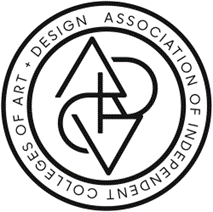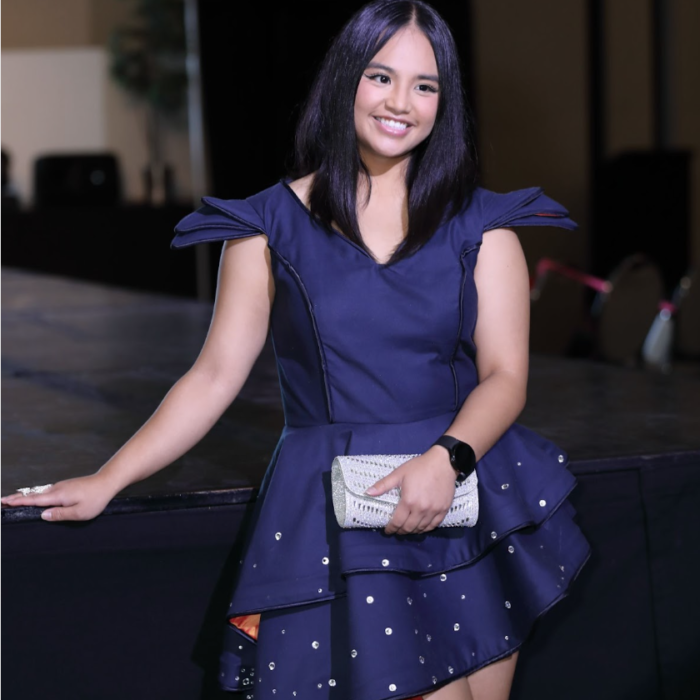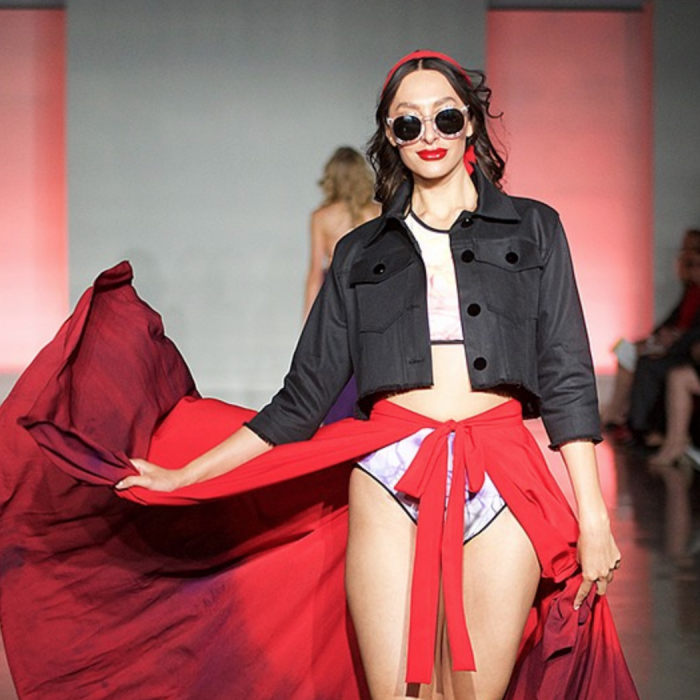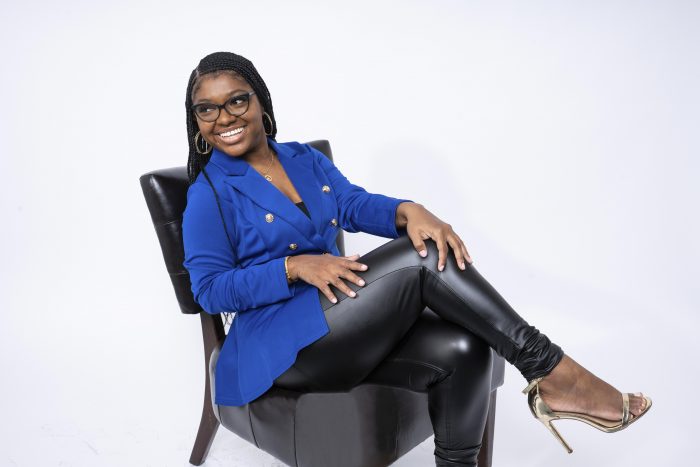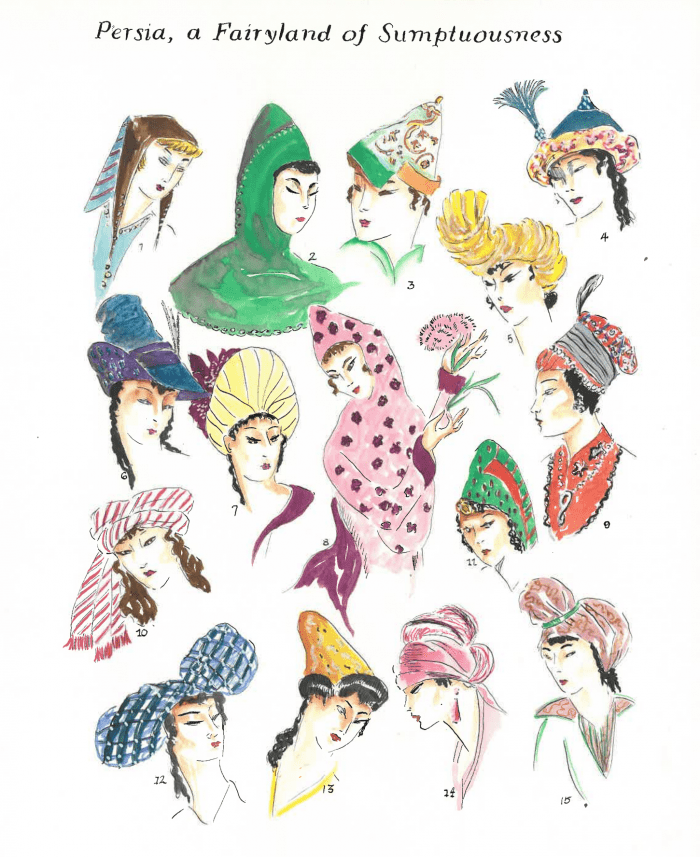School of Media : Culture : Design
Fashion Design
Bachelor of Fine Arts (BFA)
Woodbury’s Fashion Design program is tailored to meet the needs of students wishing to enter the challenging and exciting world of fashion and costume. Woodbury’s professional faculty and industry experts teach all aspects of fashion design and the innovative developments in the fashion industry.
Apply Request Information Take a TourDesign Your Future
Students produce original designs and develop unique collections during their fashion studies in categories such as womenswear, menswear, swimwear, knitwear, activewear, tailoring and couture techniques. Students also have the opportunity to explore additional design categories such as shoes, lingerie, fashion sustainability, millinery and denim.
Fundamental skill areas include new approaches to the study of textiles, including a class on treatments, embellishments, laser cutting, silk-screen printing, knitting, dying, fabric printing and embroidery.
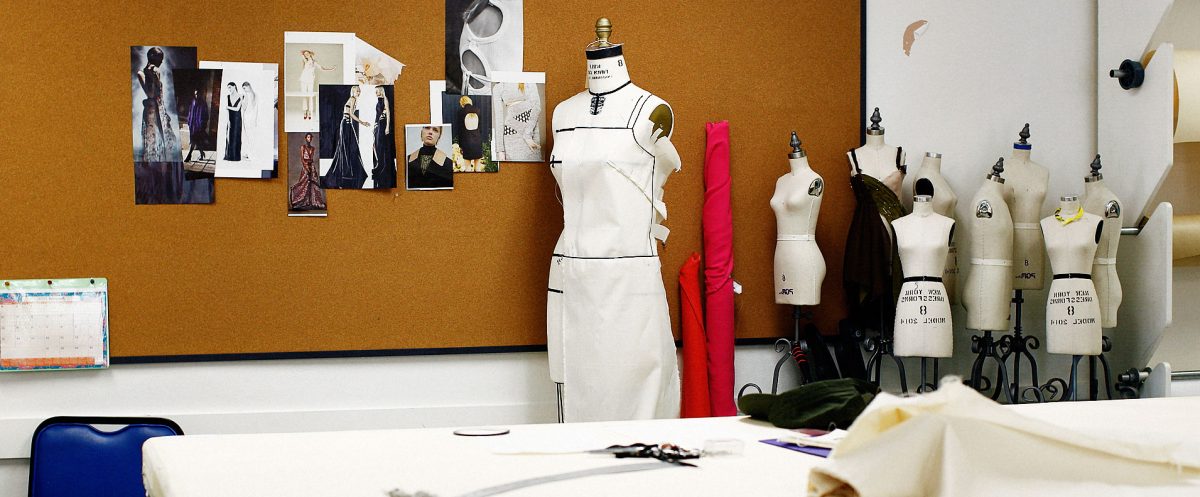
Internships & Careers
Internship opportunities:
- St. John Knits
- Max Mara
- Etro
- Leg Avenue
- Joie
- NDG Inc.
- Parker Smith Jeans
- Denimography
- Vertigo
- Evy of California
- BCBG
- Western Costume
- American Film Institute
- Komarov
- Vesture Group
- Manhattan Swimwear
- Kenneth Cole Swimwear
Internships are a required component of the BFA Fashion Design degree.
Career opportunities:
- Fashion designer
- Technical designer
- Fashion illustrator
- Stylist
- Wardrobe consultant
- Costume designer
- Costumer
- Accessories designer
- Buyer
- Product developer
- Manufacturer
- Merchandiser
Fashion Study Collection
Fashion Design students have access to the Fashion Study Collection. They can choose objects based on construction techniques, designer attribution or by chronology. Examples chosen vary and can include eighteenth century textiles, footwear, couture beading samples and knitwear. As any professor or student will tell you, nothing quite compares with being able to examine an object first-hand. It is one thing to view an image of a Paris couture gown, it is an entirely different experience to personally look at its construction details!
The collection boasts film costumes from such luminaries as Edith Head and Adrian. Indeed, Hollywood designers have long been associated with Woodbury: Howard Greer was instrumental in creating the first professional costume design training program offered by Woodbury in 1931, and William Travilla, famous for his Marilyn Monroe designs, was a Woodbury graduate. Notable fashion designers represented include Bonnie Cashin, Andre Courreges, Oscar de la Renta, Christian Dior, Mariano Fortuny, James Galanos, Jean Paul Gaultier, Rudi Gernreich, Issey Miyake, Norman Norell, Yves Saint Laurent, Arnold Scaasi, Elsa Schiaparelli and Yohji Yamamoto.
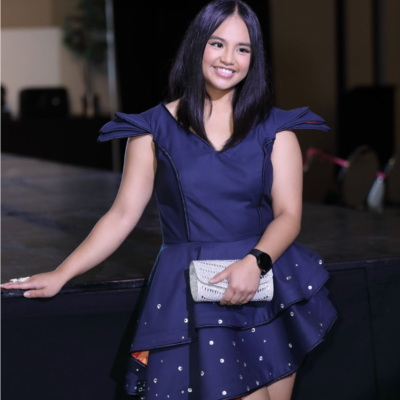
Student Spotlight
Student
Anne Cunanan
Anne Cunanan’s passion for apparel design dates back to playing with transfer fashion Barbie plates as a little girl. After graduating from Woodbury (Fashion Design, ‘22), Anne leveraged networking opportunities to land her current position as a freelance assistant designer at Glendale, CA-based Estilo Filipino under designer Lou Razon. This fall, Anne got an opportunity some designers only dream of: collaborating on a show-stopping Miss USA 2022 Pageant dress. Next up? She hopes to earn a master’s degree, a job in a high-profile fashion house, and eventually design her own line to showcase at fashion weeks around the globe. Read her story.
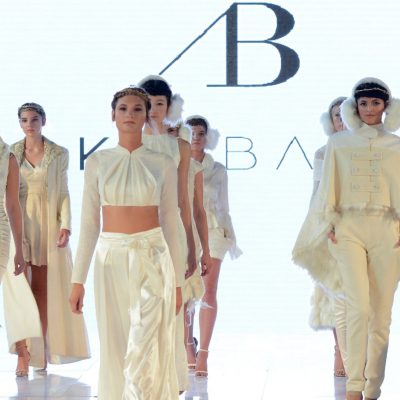
Alumni Spotlight
Alumna
Araksi Balyan
Araksi Balyan, a 2015 graduate, showcased her collection at LA Fashion Week. This collection grabs the audience’s attention not by color or print but by uniquely developed texture and treatments. “My long-term dream/goal is founding a brand that will deliver something powerful and significant to the incredibly exciting yet competitive industry of fashion.”
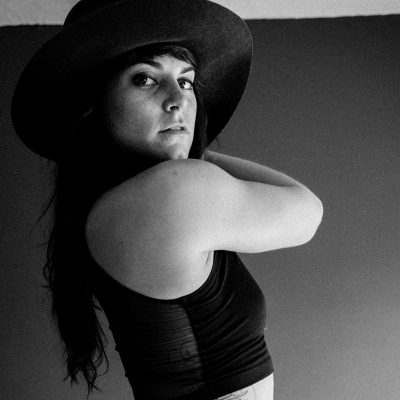
Alumni Spotlight
Alumna
Natalie Yaru
Woodbury alum Natalie Yaru’s leather clothing brand was recently featured on the cover of Rolling Stone Magazine. Natalie Yaru’s first leather collection was designed and showcased while attending Woodbury University. Currently Natalie is the CEO and head designer of MANAM, a fashion design brand specializing in luxury leather clothing and accessories. She fully supports American garment industry by running all of MANAM’s production out of Los Angeles, and she strives to bring her customer the finest quality. Her source of leather comes from ethical farms and tanneries. The LA-based fashion designer’s leather pants were worn by actor Gal Gadot a.k.a. Wonder Woman on the cover of Rolling Stone’s September 2017 edition.
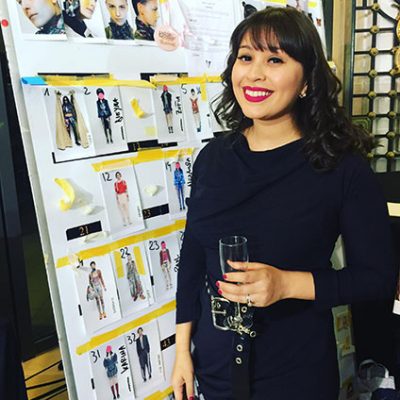
Alumni Spotlight
Alumna
Alexis Marcy
Alexis Marcy comes from a small town, but that didn’t prevent her from harnessing her passion for creativity and fashion and turning it into a highly coveted career developing new red carpet dresses, bridal looks and couture samples for a London-based fashion designer. Read about how, with the help of Woodbury, she turned her love of sewing into a rewarding and successful career.
Annual Fashion Show
Senior students create their own collections for Woodbury’s annual fashion runway event. A formal senior review process provides an opportunity for students to talk about their vision and design work, and display their collections to a jury of fashion professionals. The culmination of their fashion education is the creation of an industry-level portfolio that will open doors to their dream jobs!
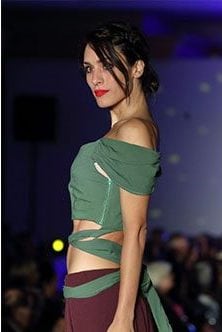
Facilities
Students have access to studios with industrial sewing machines, specialty equipment including embroidery machines, dress forms, gravity-feed irons, computer labs and drawing studios. The Digital Fabrication lab has a laser cutter and 3D printer. The Judith Tamkin Fashion Center houses rotating exhibits of student work and the Fashion Study Collection.
Fashion Courses
Woodbury’s Fashion Design curriculum promotes classic illustration methods, strong technical skills and creative thinking with an emphasis placed on developing a student’s personal design aesthetic. During this hands-on program, students utilize research, design process and conceptual thinking to develop contemporary fashion collections that are both functional and inventive. The culmination of their fashion education is the creation of an industry-level portfolio.
FOUN 102 Design and Composition
This course introduces students to the elements and principles of design and to the processes of design thinking. Formal visual properties of line, shape, form, pattern, value, texture, and sequence are studied in their relationship to content and compositional organizing systems. Studio exercises using various media explore concepts of balance, harmony, repetition, rhythm, scale, and time in two, three, and four-dimensional organizations. Emphasis is placed on developing creative design concepts, gaining practical problem-solving skills, and communicating project solutions visually and verbally. Examples of historical and professional art and design are presented so that students may recognize their influence on contemporary design and to relate their own design efforts to a larger cultural context. Studio. 3 units. Prerequisites: None.
FOUN 103 Color and Composition
This course investigates the principles, properties and interactions of color as well as the cultural and psychological implications of color across disciplines. A variety of media and sources are introduced through weekly exercises. Students will develop a working knowledge of additive and subtractive color systems, color mixing, and approaches to color harmony as well as an understanding of practical issues such as color matching, correction, and forecasting. Design thinking as it applies to visual communication is also considered in this course as an agent for mindfulness and engagement. Studio. 3 Units. Prerequisites: None.
FOUN 105 Introduction to Figure Drawing
Building on the observational drawing skills and methods gained in FOUN 101 Beginning Drawing, students in this course gain a practical understanding of the rhythms, proportions, movement, character, and anatomical structure of the human form. Through in-class study and outside sketchbook practice, additional emphasis is placed on developing the ability to visualize and adapt the human form for use in their design and related disciplines. Studio. 3 units. Prerequisite: FOUN 101 Beginning Drawing (FOUN 104 Drawing Concepts & Composition may be exchanged with FOUN 105 as a FOUN requirement except in the case of Animation majors who are required to take FOUN 104).
FDES 105 Digital Fashion Design 1
The computer role in fashion design and its creative potential is the focus of this course. Adobe Illustrator and Adobe Photoshop fundamentals will be studied to learn principles of digital designing while simultaneously developing your own drawing techniques. These programs enable the fashion designer to digitally sketch and present fashion collections. The student’s working knowledge of tools and palettes is developed, gaining speed and accuracy in creating flats and sketches. Studio. 3 units. Prerequisites: None.
FDES 301 Digital Fashion Design 2
This course focuses on the role of the computer in fashion design and its creative potential. Adobe Photoshop fundamentals will be studied to learn principles of digital designing while simultaneously developing drawing techniques. The student’s working knowledge of Photoshop tools is developed, gaining speed and accuracy in creating design groups. Studio. 2 Units. Prerequisite: FDES 105 Digital Fashion Design 1.
FDES 363 Digital Portfolio Development
This course explores the advanced use of Photoshop and Adobe Illustrator for fashion and costume design. Students learn to illustrate complex design groups combining digital and manual skills in preparation for Senior Portfolio. Studio. 3 units. Prerequisite: FDES 301 Digital Fashion Design 2.
FDES 110 Creating Character
This course will introduce the costume and fashion design student to the nuances of character development and identity. Whether designing fashion or costume, the student will learn to see, identify, and then practice the art of color, texture, fit, and proportion. Students analyze and interpret a story to understand a specific character or customer, and how to do additional research to enhance their work. They will then learn to translate that research into conceiving the perfect outfits for their muse/character. In addition, students will explore the basic skills needed for drawing and rendering costumes, including depicting specific actors or celebrities. Studio. 2 units. Prerequisites: None.
FDES 120 Visual Skills 1
This course provides an introduction to design process, illustration, model drawing, and rendering techniques for fashion figures and technical flats. It functions as a support class for Core Skills, and coordinates skill building with specific design projects. Emphasis is placed on learning basic skills, critique, as well as beginning to develop a personal visual style and design aesthetic. Studio. 3 units. Prerequisite: FOUN 105 Introduction to Figure Drawing.
FDES 121 Core Skills
This course is an introduction to the fashion industry, including the basic vocabulary and skills involved in design development. Students will explore personal identity to develop a personal aesthetic code and participate in several team projects to practice peer cooperation. Field research and speakers will enhance the course content and an inspiration sketchbook will be maintained to record the research and visual process. Studio. 2 units. Prerequisites: None.
FDES 200 Beginning Drawing Lab
This required course builds on the skills introduced in Visual Skills 1 and 2 and acts as a support drawing class for upper level transfer students. Students draw from the fashion model to refine their understanding of proportion, drape, silhouette and color, as well as the idealized figure. Emphasis is placed on developing a personal visual style, improving composition skills, and using a variety of media. A design sketchbook will enhance the learning process.
Studio. 1 unit. Prerequisite: FDES 120 Visual Skills 1 or equivalent.
FDES 220 Visual Skills 2
This course builds on the skills introduced in Visual Skills 1. Students continue to practice drawing from the fashion model to develop their eye for proportion, drape, silhouette and color. Two design projects are created from direction through final presentation. Emphasis is placed on starting to develop a personal visual style and design aesthetic. Studio. 3 units. Prerequisite: FDES 120 Visual Skills 1.
FDES 240 Materials
This course aims at developing core skills in the understanding and identification of textiles and other materials used in garment design. Emphasis is placed on the creation of effective fabric boards relating to specific design direction. Studio. 2 units. Prerequisite: FDES 121 Core Skills.
FDES 300 Intermediate Drawing Lab
This required course is the second in a series of support drawing labs that maintain and build on the skills developed in introduced in Visual Skills 1 and 2. Students draw from the fashion model to refine their understanding of proportion, drape, silhouette and color, as well as the idealized figure. Emphasis is placed on developing a personal visual style, improving composition skills, and using a variety of media. A design sketchbook will enhance the learning process. Studio. 1 unit. Prerequisites:
FDES 310 LA Fashion
This course combines design research with advanced illustration techniques and professional practice exploration. Students work with instructors to research the LA fashion industry, creating designs that reflect the youthful Los Angeles aesthetic. Projects provide a sequential series of visual and creative processes and critiques with the outcome being a finished collection of designs that will be built in Junior Collections. Emphasis is also placed on field research and discussions to enhance internship experiences. Studio. 4 units. Prerequisite: FDES 232 Knitwear and Swimwear or equivalent.
FDES 330 Textile Arts
This course provides an introduction to various traditional and innovative surface and structural treatments used for aesthetic and functional purposes in apparel design. Studio. 2 units. Prerequsite: FDES 240 Materials or equivalent.
FDES 400 Professional Practice
Focusing on the practical and business side of the fashion industry from a designer perspective, this course will address various aspects and processes of both very structured large companies and smaller, more organic businesses. Through lectures, discussions and in-class exercises, the students will learn about design cycle and personal branding. Professional attitude will be graded thorough the semester, such as timeliness, appliance to dress code, preparedness or productive participation. Studio. 2 units. Prerequisites:
FDES 410 Design and Portfolio Preparation
This course provides a structured approach to the development of an industry-level portfolio in conjunction with designing a runway quality collection. Instructors will take an individual approach to each student, focusing on their chosen area of emphasis. Design thinking, research, illustration techniques, fabric group development, and advanced digital skills are addressed and will contribute to the efficacy of the final presentation. Studio. 2 units. Prerequisite: FDES 310 LA Fashion.
FDES 411 Portfolio and Presentation
Focusing on the entrepreneurial side of the fashion industry from a designer perspective, this course addresses various aspects and processes of both start-up and small, organic businesses, as well as very structured and larger companies. Through lectures, discussions and in-class exercises, the students learn about becoming an entrepreneur, defining personal branding and implementing a successful design cycle. Professional attitude will be emphasized, including timeliness, dress code, preparedness or productive participation.
Studio. 2 units. Prerequisites: FDES 363, Digital Portfolio Design Studios 1-5.
FDES 260 History of Fashion 1
This course examines Prehistoric, ancient, and traditional world costume through the 16th century CE, emphasizing the origins of clothing and stylistic trends in Asia, Africa, and the Near East. Lecture. 3 units. Prerequisite: WRIT 111 Academic Writing 1.
FDES 261 History of Fashion 2
This course explores western costumes from the seventeenth century CE to contemporary times with an emphasis on the twentieth and twenty-first century. Lecture. 3 units. Prerequisite: WRIT 111 Academic Writing 1.
FDES 320 Art/Fashion Symposium
A ten-week course designed to take students off-campus to explore relevant museum and gallery shows relating to fashion. Theoretical readings and lectures will enhance discussions of the various shows and exhibits and students will keep a sketchbook of drawings and ideas reflecting on the various activities. Studio. 1 unit. Prerequisites: FDES 260 Fashion History 1 and FDES 261 History of Fashion 2.
FDES 110 Creating Character
This course will introduce the costume and fashion design student to the nuances of character development and identity. Whether designing fashion or costume, the student will learn to see, identify, and then practice the art of color, texture, fit, and proportion. Students analyze and interpret a story to understand a specific character or customer, and how to do additional research to enhance their work. They will then learn to translate that research into conceiving the perfect outfits for their muse/character. In addition, students will explore the basic skills needed for drawing and rendering costumes, including depicting specific actors or celebrities. Studio. 2 units. Prerequisites: None.
FDES 3XX Costume Design for Film
This course introduces the elements of analyzing and preparing the costume designs for film scripts, conferring with the director and solidifying character concepts. Studio. 2 units. Prerequisites: None.
FDES 411 Portfolio and Presentation
Focusing on the entrepreneurial side of the fashion industry from a designer perspective, this course addresses various aspects and processes of both start-up and small, organic businesses, as well as very structured and larger companies. Through lectures, discussions and in-class exercises, the students learn about becoming an entrepreneur, defining personal branding and implementing a successful design cycle. Professional attitude will be emphasized, including timeliness, dress code, preparedness or productive participation. Studio. 2 units. Prerequisites: FDES 363 Digital Portfolio and Design Studios 1-5.
FDES 3717 On-Set Costuming
FDES 3719 Costume Collection 1
Costume Collection 1 begins the research and design phase of the costumes for the supporting characters to be presented at the Senior Costume Collection. Collaboration, as well as individual growth in design, will be emphasized. Studio. 3 units. Prerequisites: None.
FDES 3729 Film Project 1
FDES 4705 Costume Collection 2
Costume Collection 2 initiates and completes the assembly and construction of costumes for supporting characters in the presentation of the Senior Costume Collection in the year-end fashion show. Collaboration as well as individual growth in design and construction will be emphasized. Studio. 4 units. Prerequisites: WRIT 112 Academic Writing and LSCI 105 Information Theory and Practice.
FDES 100 Sewing Machine Technology
Studio. 1 unit. Prerequisite: None.
FDES 125 Technical Studio 1
This course is an introduction to basic flat pattern making, draping, and sewing techniques. Muslin and fabric samples are constructed with the use of industry power machines, fitted and completed into finished garments. Studio. 3 units. Prerequisites: None.
FDES 126 Technical Studio 2
This course provides a study of creating patterns through draping and drafting techniques and builds on the skills learned on Technical Studio 1. Designs are translated into muslin and fabric directly on the dress form. Complex designs are interpreted through flat pattern techniques, production patterns are developed and graded and markers are made. A coordinated separates group is produced for the final review. Studio. 3 units. Prerequisite: FDES 125 Technical Studio 1.
FDES 226 Advanced Technical Studio
This advanced course reviews and reinforces flat pattern, draping, and construction techniques. Special attention is given to development and construction of complex facings, lapels, and closures. Pattern marking and labeling is standardized. Fabrics are researched and purchased, resulting in finished coordinated garments. Design instructors oversee the design process, and the finished group is juried for the show. Studio. 3 units. Prerequisite: FDES 126 Technical Studio 2 or equivalent transfer credit.
FDES 232 Knitwear and Swimwear
Knitwear and swimwear markets are researched. Garments for males and females are designed and constructed through advanced draping and advanced pattern-making methods. Finished looks are uried for the fashion show. Studio. 4 units. Prerequisite: FDES 226 Advanced Technical Studio.
FDES 280 Experimental Draping/Patterns
Students will explore radical free-form draping techniques, repurposing existing garments, and creating pattern blocks from the resulting details and silhouettes. Sustainability issues will be used to generate projects as will in-depth research of creative influences and historical precedence. Developing industry-level pattern-making skills will be a priority. Studio. 2 units. Prerequisite: FDES 226 Advanced Technical Studio or equivalent.
FDES 331 Advanced Draping/Tailoring
This advanced construction course builds on the skills learned in Experimental Draping and Patterning through the study of complex draping techniques, and introduces students to advanced tailoring techniques through the patterning and construction of a tailored jacket and trousers. Studio. 3 units. Prerequisites: FDES 226, Advanced Technical Studio and FDES 280 Experimental Draping or equivalent.
FDES 332 Junior Collection
Junior Collection is a studio construction course that builds on the work done in Advanced Draping/Patterning and LA Collections. Students construct two to three outfits from their design groups that can be juried into the runway show. Garments are constructed through draping, tailoring techniques, and sewing procedures. Studio. 3 units. Prerequisite: FDES 331 Advanced Draping/Tailoring.
FDES 431 Senior Collection 1
This course involves the design and construction of high fashion and experimental designer garments to create a cohesive collection for the runway. Course includes fabric selection, draping, patternmaking, prototype muslins, model fittings, and high-end construction techniques using professional industry finishes. Studio. 3 units. Prerequisite: Design Studios 1-5.
FDES 432 Senior Collection 2
This course continues the design and construction of an innovative, well-merchandised collection, culminating in a Design Review presentation with industry professionals. The capstone projects are showcased in the yearly runway show. Studio. 4 units. Prerequisite: FDES 431 Senior Collection 1.
Portfolio Requirements
All incoming freshmen and transfers applying for Spring 2024 semester or the Fall 2024-2025 academic year are asked to submit a portfolio and written statement. Learn more about the requirement details and submit your portfolio:
Faculty Directory
Woodbury’s faculty are accomplished, caring academics and professionals dedicated to supporting the success of students throughout their academic journey. They bring their professional expertise to students and work closely with them to teach the skills and theory required to enter professional practice or pursue advanced study. Through this individual attention, Woodbury fosters close mentoring relationships between faculty and students in a supportive and encouraging environment.
University accredited by:
NASAD: National Association of Schools of Arts & Design
WSCUC: Senior College and University Commission (formerly WASC)
